Search the Special Collections and Archives Portal
Search Results
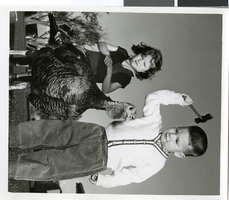
Photograph of Troy Pritchard at the annual "Turkey Trot," Sands Hotel, Las Vegas, circa mid 1950s - early 1960s
Date
1955 to 1964
Archival Collection
Description
Three-year-old Troy Pritchard chasing a turkey in the annual "Turkey Trot" held at the Sands Hotel in Las Vegas, Nevada. Little Troy is holding a small axe as he stands beside an unidentified young girl.
Image
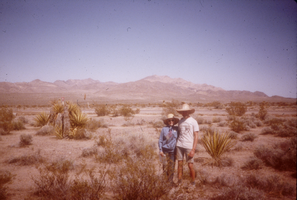
Slide of Sister Rosemary Lynch and friend at the American Peace Test demonstration near the Nevada Test Site, March 20, 1988
Date
1988-03-20
Archival Collection
Description
Color image of Sister Rosemary Lynch (right) standing with Fritz [der Herde] at the 10-day demonstration known as "Reclaim the Test Site" that was organized by American Peace Test, an anti-nuclear testing group.
Image
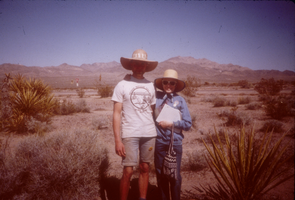
Slide of Sister Rosemary Lynch and friend at the American Peace Test demonstration near the Nevada Test Site, March 20, 1988
Date
1988-03-20
Archival Collection
Description
Color image of Sister Rosemary Lynch (right) standing with Fritz [der Herde] at the 10-day demonstration known as "Reclaim the Test Site" that was organized by American Peace Test, an anti-nuclear testing group.
Image
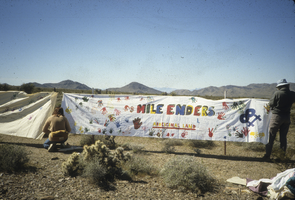
Slide of protesters with a large banner at the Reclaim the Test Site demonstrations near the Nevada Test Site, March 12, 1988
Date
1988-03-12
Archival Collection
Description
Color image of some of the protesters at a 10-day demonstration known as "Reclaim the Test Site" that was organized by American Peace Test, an anti-nuclear testing group. This banner is covered in handprints and reads: "Mile Enders - South Australia Aboriginal Land."
Image
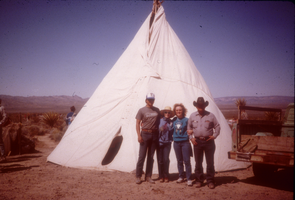
Slide of Ian Zabarte and others standing in front of a teepee at the Reclaim the Test Site demonstrations near the Nevada Test Site, March 20, 1988
Date
1988-03-20
Archival Collection
Description
Color image of (left to right) Ian Zabarte, Sister Rosemary Lynch, Kathy Thorpe and Ray Yowell during a 10-day demonstration known as "Reclaim the Test Site" that was organized by American Peace Test, an anti-nuclear testing group.
Image
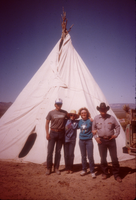
Slide of Ian Zabarte and others standing in front of a teepee at the Reclaim the Test Site demonstrations near the Nevada Test Site, March 20, 1988
Date
1988-03-20
Archival Collection
Description
Color image of (left to right) Ian Zabarte, Sister Rosemary Lynch, Kathy Thorpe and Ray Yowell during a 10-day demonstration known as "Reclaim the Test Site" that was organized by American Peace Test, an anti-nuclear testing group.
Image
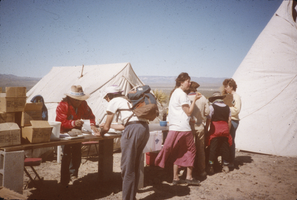
Slide of Bill Rosse distributing permits to enter Shoshone land at a protest near the Nevada Test Site, March 20, 1988
Date
1988-03-20
Archival Collection
Description
Color image of Bill Rosse giving out Western Shoshone National Council permits for activists to enter Shoshone land at a peace protest. This was near the end of the 10-day "Reclaim the Test Site" demonstrations against nuclear testing.
Image
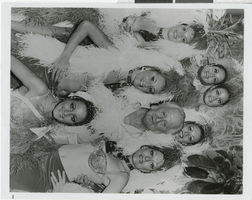
Photograph of Harold Minsky and showgirls, Chicago (Ill.), 1970-1979
Date
1970 to 1979
Archival Collection
Description
Harold Minsky poses with six showgirls at the Playboy Hotel. The dancers are wearing rhinestone bikini-style costumes and large feathered headdresses. The Knickerbocker has gone through several incarnations since it opened in 1927. Legend has it that in the 1930s the hotel housed a casino frequented by Al Capone. During World War II and the Korean War, US Armed Forces officers would fill the property's hallways and play cards in the Officer's Club. In 1952, Richard Nixon was nominated Vice President during the Republican National Convention held in the hotel. Finally, in the 1970s it became the Playboy Hotel, owned by Hugh Hefner. Site Name: Playboy Hotel (Chicago, Ill.) Street Address: 163 East Walton Place
Image
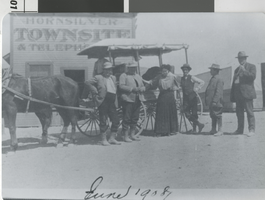
Photograph of the arrival of a stagecoach from Stonewall Station in Hornsilver (Nev.), 1908
Date
1908-06
Archival Collection
Description
Arrival of a stagecoach from Stonewall Station, Hornsilver, Nevada, June 1908. There is an inscription on the back of the image. "Hornsilver, originally known as Lime Point, was settled when silver was discovered in the area in the 1860's. The name of the camp was changed to Hornsilver in 1908 when rich Hornsilver was found in the area. In the 1930's when gold became the major product of the area the name of the town was again changed, this time to Gold Point, the name it is known by today." There is a date stamp: May 1979.
Image
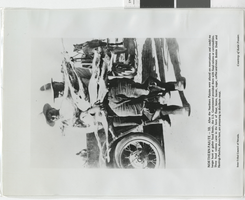
Photograph of food rations being distributed at Paiute reservation, early 1900s
Date
1900 to 1920
Archival Collection
Description
Transcribed from the picture, "Northern Paiute - 10. After the Northern Paiutes were placed on reservations and could no longer hunt or gather food freely, the U.S. Government provided them with food rations or commodities. These food rations came in the form of flour, beans, bacon, sugar, coffee and meat. Bobbie Dodd and Hastings Pancho, shown here, are preparing to distribute meat. Inter-Tribal Council of Nevada. Courtesy of Katie Frazier."
Image
Pagination
Refine my results
Content Type
Creator or Contributor
Subject
Archival Collection
Digital Project
Resource Type
Year
Material Type
Place
Language
Records Classification
